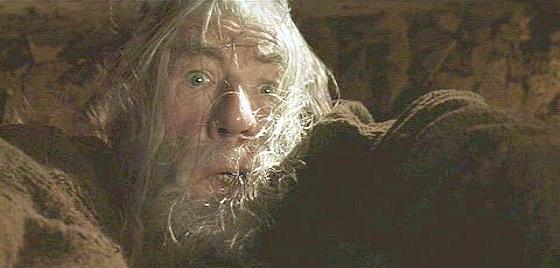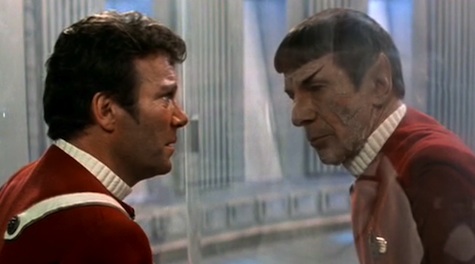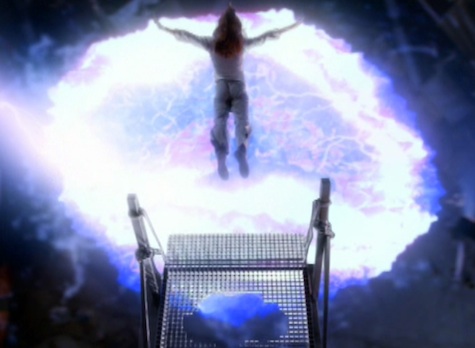In many ways the conception of Valentine’s Day feels a bit like a science fiction thing, or at the very least, an urban legend. Unlike Saint Patrick, who totally, for real, drove snakes out of Ireland (maybe), details about exactly what Saint Valentine did are dubiously muddled. The essential fact is this: at some point there was a Saint Valentine who was certainly a martyr, so it might as well be for love!
But when you stop to reflect on it, science fiction and fantasy is lousy with martyrs, and we probably know much more about them than we’ll ever know about Saint Valentine. Here are seven martyrs who keep sci-fi and fantasy going, mostly because they seem to always come back after they’ve died!

Gandalf (The Lord of the Rings)
One of the nice things about being a genre-fiction martyr is that you often get to come back to life at just the right moment. That being said, Gandalf’s “Fly, you fools!” line is probably one of the best parting lines of all time. Gandalf is so badass that he insults you while he’s saving you from the Balrog. Also, if you’re going to check out as a martyr, you might as well go out fighting the Balrog known as “Durin’s Bane,” whilst bellowing “You shall not pass!” like a maniac. It’s hard to be a cooler martyr than Gandalf, though some have tried. And does Gandalf coming back as the slightly more amoral Gandalf the White ruin his martyrdom? No! However, he was probably at his wizardly slickest in those Mines of Moria.

John Sheridan (Babylon 5)
Speaking of people who return from the dead slightly weirder than before, Sheridan from Babylon 5 managed to come back to life after his martyrdom thanks to the power of his love for Delenn. Sheridan’s martyrdom in Babylon 5 is significant because of what it sets into motion for all the other alien races. If he hadn’t blown himself up to take down the Shadows, a lot of those folks probably wouldn’t have gotten on board with the whole fighting the darkness thing. Good work, Sheridan!

Spock (Star Trek)
In many ways, Spock is a career martyr. He’s always trying to sacrifice and/or punish himself for stuff in the original TV show. In “Operation: Annihilate!” he nearly blinds himself in order to kill the creepy parasite/flying pancake things. In “Amok Time” he promptly decides to turn himself into the space cops after he thinks he’s killed Kirk, and of course there’s that whole radiation poisoning/fixing the warp drive stunt he pulled in The Wrath of Khan. Though Bones “liked him better before he died,” Spock actually doesn’t become an asshole when he gets resurrected, and his martyr-like behavior (whether he actually dies or not) usually is truly selfless. One of the reasons we like Spock so much is precisely because of this quality: if Spock were a celebrity pop star, he’d probably ONLY do charity concerts. And he’d mean it.

The Doctor (Doctor Who)
Which incarnation of the Doctor is the biggest martyr? We could make a strong argument for the Ninth Doctor, since he is arguably the most angry, thanks to his previous incarnation (supposedly) ending the Time War and his entire race with it.
In a way the Doctor is sort of an inverse martyr because he performs martyr-like actions, and then has to live through, and with, the consequences. Killing all your own people is certainly not the same as being a martyr, but absorbing the time vortex, or a bunch of radiation, certainly is. (Seriously, how often does the Doctor die and then regenerate because he’s absorbed a bunch of something or other?) Regeneration is such a great sci-fi trick though, because it allows the character to have his death and martyrdom… and then keep on living. Which brings us to….

Buffy Summers (Buffy the Vampire Slayer)
Let’s see… how many times has Buffy died and come back? And it’s not just the fact that she has been shuffled off this mortal coil only to be resurrected more than once, it’s that she might have been a whole lot happier staying dead. When Buffy comes back from some heaven-like place following her second major life sacrifice in season five, she tries to keep the truth from her friends—being done with the whole slaying thing had been awesome. But she gets it together once more, becomes a counselor at school, then a Slayer grand dame, and keeps saving the world over and over. It’s not just that Buffy has sacrificed herself, it’s that she will never stop doing it—maybe not always by physically giving up her life, but by repeatedly sacrificing her love life, her friends and associates, and her personal happiness. Heck, it turns out that dying was the easy part.

Sherlock Holmes (Sherlock, et al.)
Though the martyrdom of Sherlock Holmes is not technically science fiction or fantasy (though I truly believe you can make a case for it being in the genre!) it has become significant recently, perhaps more than ever before. Yes, readers famously wore black armbands after Arthur Conan Doyle killed off Holmes in “The Final Problem,” but that swell of devotion may have been eclipsed in 2012 by the “I Believe in Sherlock” fan phenomenon which popped up on the internet after the airing of “The Reichenbach Fall.” As many have pointed out before, any adaptation of “The Final Problem” is poised to be better than the original, because Conan Doyle clearly didn’t give a shit about that story making sense. BBC’s Sherlock crafted perhaps the best possible version of this story by having Sherlock’s martyrdom not only be accomplished by his death, but also the complete loss of his precious reputation. His phone call to John might just be the most heartbreaking Sherlock Holmes-related moment of all time.
Valentine Michael Smith (Stranger in a Strange Land)
Did you think we’d get through a Valentine’s Day martyr post without mentioning the guy who has “Valentine” in his name? Way to be subtle, Robert A. Heinlein! We know there are an infinite number of opinions about Stranger in a Strange Land, but beyond having an awesome title (and premise) the final scenes of Valentine Michael Smith’s life easily qualify him for best genre martyr ever. Not only did this character introduce the word “grok” into the pop cultural lexicon, he also inverted all the mores of the future world in which he lived. And how did society repay him? Mob violence takes him down! Luckily, he gets to talk to his pal Jubal from the afterlife, and the book about his life is still in print and readily available. Now, we know this might be an inappropriate time to bring this up, but where’s our damn Stranger in a Strange Land movie already? And why is Michael Fassbender not playing Valentine Michael Smith?
In any case, Happy Martyr Day, everyone!
This article originally appeared February 14, 2013 on Tor.com
Ryan Britt is a long-time contributor to Tor.com.
Emmet Asher-Perrin is a staff writer at Tor.com.










